- Home
- A P Bateman
The Five Page 12
The Five Read online
Page 12
Your life would never be the same again. For many, it would be over.
“Sign here,” the captain said. He held out his hand for Caroline’s bag. She had secreted the Sig under her seat as they had got out of the vehicle. The captain took the handbag and dropped it into a clear, plastic self-sealing bag. He sealed it and handed it to a guard. Both men were black and built like front row rugby players.
Kruger signed his name also and checked in his pistol. It had been agreed that he would be present during the interview as part of Interpol’s liaison with the South African intelligence service.
A white man with an ample stomach and fair hair, combed across and backwards in a quiff which would have made Donald Trump jealous, walked through the inner door. He walked up to Kruger, held out his hand. “Preet Boesak, I’m the governor here at Pollsmoor,” he said. He nodded a brief acknowledgement to Caroline, then turned his attention back to Kruger. “I will help in any way I can,” he said. “What is it you wish to know?”
“I wish to talk to your prisoner Vigus Badenhorst, as arranged through Interpol and the South African government,” Caroline paused. “I believe you had written notification of my visit. And I’m over here, Governor Boesak.”
Boesak smiled. “Sorry, my dear,” he said in a thick, guttural drawl. “Naturally, I thought you were Agent Kruger’s assistant.” The two black guards sniggered, then carried on checking in the security bags.
Caroline yawned. “Governor Boesak,” she paused. “Bigger, better and far more influential men than yourself have tried and failed to belittle me in the past. What makes you think your petty and infantile attempts at male chauvinism are going to lose me a seconds’ sleep? I hunt down terrorists for a living.”
“Listen, little lady…” He glared.
Caroline interrupted him. “When addressing me, use non-gender specific referencing, if you please. I’m not lady, darling or sweetheart. I’m certainly not little lady. You will address me as Ms Darby. I have been asked to file a full and detailed report on Pollsmoor Prison’s assistance with this enquiry by the South African judicial department. I’m guessing when they say Pollsmoor Prison, they actually mean you?”
Kruger smiled as he intervened. “Thank you Governor Boesak, we just need somebody to take us to him.” He was calm and polite, and it was evident he had only spoken to diffuse the situation.
Boesak nodded, but his eyes were still on Caroline. He looked over slowly to Kruger. “Of course,” he said. He nodded to the taller of the two black men. “The captain will take you down. Enjoy the walk, Ms Darby.”
Caroline nodded. “Thank you, Governor Boesak,” she said, but she figured she knew what he had meant. She had never been inside a prison before, and Pollsmoor’s reputation was unrivalled.
The captain waited for the door to open electronically then led the way down the corridor. The walls were whitewashed and smooth. At the end of the corridor, approximately fifty metres further down, there was a clear Perspex door, behind which, Caroline could see steel bars. The captain hesitated at the door and turned to Caroline. “They’s not seen a woman in a while, missy,” he said. “Your boy is in Medium B Prison. He’s not a hard man, maybe because, well, you know. So, he’s a woman now.”
Kruger drew near to Caroline. “Young offenders go to A Prison, and prisoners sentenced for up to a year or due for parole go to C Prison,” he explained. “B Prison is renowned for gang members and in here, the gang members rule.”
“But what did he mean by he’s a woman now?”
Kruger pulled a face. “It’s rough in here,” he said. “There’s men in here with multiple life sentences. You’ve heard of prison gay, haven’t you? Well, gangs like the Twenty Eights, they use rape as a means of asserting their authority. They give new inmates a choice: be their woman or they’ll be killed. Often, they use a new inmate in the opposite way: kill this guy, or you’ll be raped by every member of the gang.”
“And the guards know this goes on?” she whispered.
Kruger nodded. “From what I’ve heard, the guards encourage it,” he whispered back. “It keeps everyone busy.”
The captain waited at the Perspex door and looked up at a camera. The door slid open smoothly and they were enveloped by it all. Truly an assault on the senses. A miasma of heat, body odour, screaming, jeering and the banging of metal bars on reinforced steel doorframes filled their senses. Caroline took an involuntary step backwards, then checked herself, feeling slightly embarrassed at her reaction, and followed the captain into the melee. Kruger followed. He did not seem fazed and Caroline suspected the agent had been here before.
They walked on a steel grate, a skywalk away from the prisoners, who were milling around below them, or leaning on the railings adjacent. Caroline felt wetness on her face, realised that a man was spitting into the palm of his hand and flinging it her way. She screwed up her face in disgust, wiped the spit away with her sleeve. Resisted the urge to vomit.
“You’re lucky it’s just spit,” the captain said through a lecherous smile. “We might go back another way, before he gets busy with himself and gives you a real surprise!”
Caroline grimaced. She could hear what the men were shouting, picked up the odd line between the cacophony of noise that seemed to reverberate inside her chest. She looked down on the men, glanced to her right as they walked, realised what a hell on earth this place was.
There was an identical set of steel bars and another Perspex door at the other end of the skywalk, and thankfully it was in sight. There were curious looking viewing towers protruding from the walls. Caroline saw a man sitting inside one of them holding a shotgun. She realised that these were most likely used in case of a large fight or riot. The guard didn’t look interested in anything much, not even the attractive blonde-haired woman striding across the walkway in front of him. The captain stood for the camera and the steel gate opened. They stepped through and it closed behind them, briefly boxing them in before the Perspex door slid open. Caroline and Kruger followed the captain and the Perspex door closed behind them, drowning out the noise so suddenly that they felt light headed and off kilter for a few moments.
“Takes some getting used to, eh? I used to hear it in my sleep,” the captain smiled. “Prisoner Badenhorst should be in an interrogation cell for you by now,” he said.
They walked on around a long curve in the corridor and came up on a desk and a bank of monitors. It was a CCTV station of the general population and specific isolation cells, and a guard was ignoring it all and reading a newspaper at the desk. He looked up but didn’t abandon his paper. He nodded at the captain and the two exchanged words. Caroline didn’t understand any of it, so broad, so pidgin that it sounded like another language. She supposed it could have been a shared tribal tongue, but didn’t feel she could ask Kruger. She glanced at one of the CCTV screens, saw two prisoners beating another. The prisoner went down, and the two men started kicking him.
She pointed at the screen. “There’s a fight taking place,” she said.
The guard glanced up at the screen, then looked back at his newspaper.
The captain ignored the screen also. He nodded down the corridor at them, cocking his head towards a series of doors. “Cell four,” he said and pulled out a chair. He sat down without another word and picked up another copy of a well-read newspaper that was folded on the desk.
Caroline led the way to the door and studied the handle. It was a simple pulldown lever. It wasn’t the design that had halted her, but the dried blood covering the handle. She opened the door using the point of her elbow and eased the door inwards.
Inside, a hunched and cowed figure sat at the stainless-steel table. There was a ring on the table and the man was tethered by a set of handcuffs. The chain was short, and he was attempting to scratch his nose when they entered, but was having difficulty.
“Mister Badenhorst, I am Caroline Darby and I’m an agent with Interpol,” she said, her tone somewhere between warm and authoritative. “Thank you for meeting
with me.”
The man looked thin and gaunt and Caroline noticed the reason he had been struggling to carry out the simple bodily function. His left arm was gone from what would have been just above the elbow.
“I wasn’t exactly given a choice,” he said.
Caroline nodded. “Well, it is appreciated. Now, Mister Badenhorst,” she paused, looking at his arm. “I wish to know about the man who did that to you. I want you to help me to find him.”
25
King looked out across the valley to the Jameson’s farmhouse. Two thousand five hundred metres away. He could see the window that the shot had been taken from. He could remember the look of surprise on the woman’s face, the man’s bruises and cuts, the neat little bullet hole in his forehead. He thought about Liam.
Callously and meticulously suffocated.
He had seen worse, that was human nature. He had seen atrocities in the war-torn areas of Northern Iraq and Syria that were indescribable. But this wasn’t a warzone. This wasn’t some foreign scrap of dirt in the middle of the fighting grounds of an Islamic State. This was leafy Cornwall, and this was the grisly and unnecessary end to a family who had been pulled into a campaign which was being praised by people all over social media.
Ordinary people were publicly accepting and even condoning innocent deaths as collateral damage in a war on the wealthy. The absurdness that people spouted online was beyond comprehension for King. The anonymity of living a sheltered life through Wi-Fi, a keyboard and a screen, and losing touch with reality.
A redundant existence.
“So, why are we out here?” Amanda asked. “Are you not happy with my investigation? I can assure you I have been meticulous.”
King ignored her and turned his back on the farmhouse. The chair in which Sir Ian Snell died was still there, pulled out slightly from the rest of the furniture set.
He pictured the image of the man when he had first seen him. Slumped forwards, his head blown away above the bullet’s entrance and exit points. It had left a crimson splash on the patio, which was now scrubbed clean, but still the stain was visible. More than just a water mark yet to dry. There was still enough protein left in the bleach and water solution used to sluice the blood away to leave its grisly mark.
“Does that not strike you as weird?” he asked.
“What?”
“Helena Snell and her lover coming back here, so soon after her husband’s death.”
She shrugged. “If they are having an affair, then maybe losing her husband wasn’t the worst thing that could happen?”
“No doubt,” King said.
“Maybe that’s how she gets over grief, of sadness. Losing herself physically and emotionally with someone else? Maybe she just likes sex and wanted to feel good?”
King shrugged.
“But you think there’s more to it?”
“There always is,” he paused. “And the cups. Why are there nothing but coffee cups in the dish washer?”
“They drank coffee?”
“Two cups.”
“You’ve never drank a drink and put the cup on the draining board, only to pour another into a clean glass?”
“Perhaps.” King shrugged. “Glasses maybe. It’s a visual thing. Glasses smear with lips and fingerprints. You often change what you’re drinking as well. But cups? People just make another, don’t they? Pour tea or coffee straight into the same cup. I do. Most of the people I know do as well. And then there’s the fact that they didn’t use a milk jug, or a creamer, or even a pot to make it. Or one of those plunger things, even.”
“A cafetiere?” she smirked.
“Yes.” He ignored her expression. “This isn’t a Nescafe house. Helena Snell isn’t going to drop in a teaspoon of instant granules. So, where’s the rest of the things to make the coffee?”
“There’s a five grand Italian coffee machine in there.”
“There is?”
“Yes. Set in the wall, next to the oven.”
“Still need a spoon, don’t you? There were no spoons in the dishwasher, just mugs.”
“The machine makes it how you want it. Finishes it off with frothed milk, I imagine.” She shrugged like it didn’t matter anyway. “You knew all about… what was his name? Viktor Berkoff?”
“Bukov,” King corrected her. “Yes. MI6 did some background checking and it was flagged up. Sir Ian Snell’s company, GeoSpec, won the contract to produce the motherboards for the new Goliath ICBM system. The nuclear weapons that will eventually replace Trident. After confirmation of the deal, GeoSpec’s shares went stratospheric. Naturally, anyone working for Snell and his company were thoroughly background checked by the government. There tends to be a pattern of concentric circles when checking an individual. The further out from the priority, the less stringent the check. So, Sir Ian Snell and his executives, his family and close friends all get thoroughly vetted. The catering staff and cleaners, those on the outer circles, at GeoSpec all get checked but the vetting isn’t so concise. Otherwise, where does it end? But being Ian Snell’s employee, his wife’s personal bodyguard and family member, Ivan Kerchenko was in that inner circle,” King paused. “Except it was soon realised that Kerchenko, the real one, was back in Russia. MI6 being what they are, kept the imposter in play. They decided to watch to see what the scam was. The bigger picture. They handed this information over to MI5 and Interpol when it became evident that Snell was on the kill list. I was tasked with the investigation.”
“So, you were already investigating Snell when Anarchy to Recreate Society started killing the top five on the rich list?”
“I was investigating, yes. But not just Snell.” King nodded. “MI5 kept me in play, and with Interpol’s remit, I was tasked with investigating Snell. Especially as the killing had been done with what was clearly military expertise.”
“The sniper.”
“Exactly.”
“So, what have you found out so far?”
King shrugged. “Not a hell of a lot,” he said. “Or, more than I can make sense of at the moment, at least. It’s like a chunk of rock. There’s a statue in there somewhere, it just needs chipping away at.”
He could see Helena Snell and Viktor Bukov watching them from inside. Helena was perched on a loveseat, her long and shapely bare legs tucked under her. She looked feline, her arms on the seat, her long fingernails tapping in rhythm with her breathing. Her eyes were focused directly on King, almond shaped, predatory. But she was calm, her expression unreadable. By contrast, standing behind her, his eyes staring daggers, Bukov looked seething. But more than that, he looked worried too. Out of the two, Helena was the poker player. Bukov was more roulette. He’d either win or go bust. But Helena would play the strategies.
King looked back at the stain on the ground, then to the house across the valley, then to the stain again, then further towards the wall. He was forming a picture in his mind. He looked back at Bukov, then back to the wall. There was a flicker in the Russian’s eyes, but his lover remained calm and composed.
The wall was made from stones that ranged from shards the size of a paperback through to rocks twice the size of a shoebox. Pieces of cut and shaped granite, laid with earth between the stones, Cornish hedge style. Lavender and rosemary grew on top and a flowery plant was trailing down, the fronds touching the patio. King did not know what type of plant it was, nor did he care. He walked over, knelt and studied the wall. He ran his hands gently over the wall, looked back at the house for confirmation, then lifted the plant out of the way. There were tiny chips of stone on the edge of the patio where it met the wall. He looked up at Amanda. “Here, hold this out of the way,” he said. “And bring your bag of tricks.”
“What is it?” Amanda hurried over, glanced over her shoulder at the two behind the glass of the patio doors. They seemed impassive. Helena still watching, tapping her fingers. Bukov’s eyes must have been hurting now from maintaining the menacing stare. She looked back at King. “What have you found?”
&nb
sp; King took out his pocket knife, thumbed open the blade and dug it into the rock. After digging and prising it, the deformed bullet dropped onto the patio. It was flattened like a mushroom, the copper torn up into shards, the soft lead underneath grooved and textured from hitting the rock. “I’d say this was the first shot fired,” he said. He pulled back the tendrils of the plant without care and laid it flat on top of the wall.
“That would have made a hell of a racket, hitting the granite wall like that,” Amanda said. She picked up the bullet with a pair of plastic tongs and dropped it into an evidence bag.
“And here’s the next one,” King said. He looked back at the house across the valley and then down at the stain on the patio. “Right a click, up a couple more.”
“What?”
“Doesn’t matter,” he said.
The wind had been crossing the valley from the Carrick Roads yesterday. A westerly. Two to three miles per hour. Just enough to send the .338 bullet a few inches in front of Ian Snell’s face as he drank his coffee and read his paper.
“You mean sight calibrations?”
King frowned at her. “You know about those?”
“Sort of,” she replied.
“Right,” he said. “So, the first bullet went low and wide. The rifle is sighted and accurate, so you don’t just aim a bit right and high. That’s winging it. Alright in a fast-moving combat zone, where you want to keep your weapon calibrated for multiple scenarios. Not at two thousand five hundred metres. You can’t just hold the crosshairs high and right and hope at that range. You need minute adjustments, and if you don’t have a spotter…”
“A spotter?”
“Yes. A partner watching and feeding the information back to you. So, if you’re on your own, you adjust the sight turrets and compensate. Right a click, up a couple more. The next shot gets closer, you identify the bullet strike. Another shot, another adjustment. Then…”
“Bullseye,” Amanda interrupted.
“Essentially, yes,” agreed King. “But on a range, that’s fine. Out in the open, say, Afghanistan, yes.”

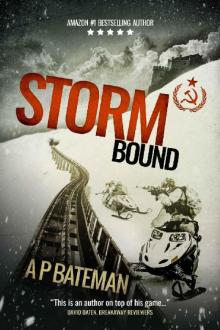 Stormbound
Stormbound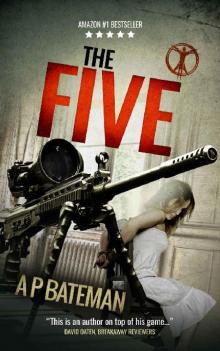 The Five
The Five The Alex King Series
The Alex King Series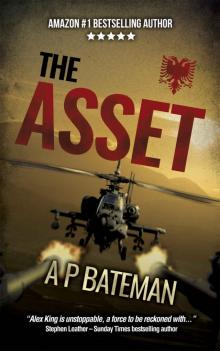 The Asset (Alex King Book 10)
The Asset (Alex King Book 10)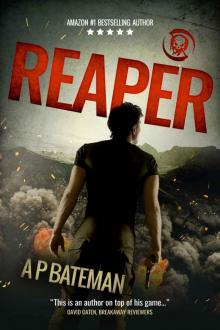 Reaper
Reaper Breakout
Breakout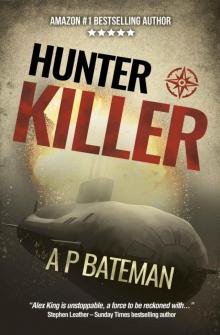 Hunter Killer - Alex King Series 12 (2021)
Hunter Killer - Alex King Series 12 (2021)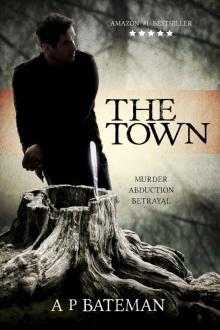 The Town (Rob Stone Book 2)
The Town (Rob Stone Book 2)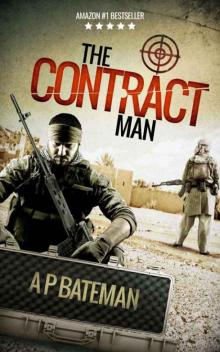 The Contract Man
The Contract Man The Island (Rob Stone Book 3)
The Island (Rob Stone Book 3)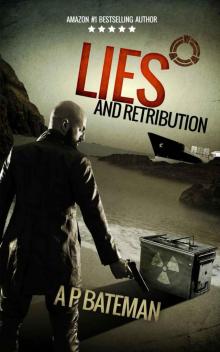 Lies and Retribution (Alex King Book 2)
Lies and Retribution (Alex King Book 2)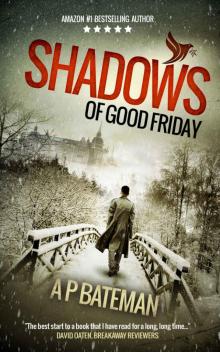 Shadows of Good Friday (Alex King Book 3)
Shadows of Good Friday (Alex King Book 3)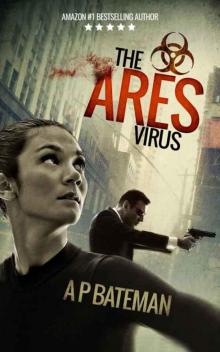 The Ares Virus
The Ares Virus